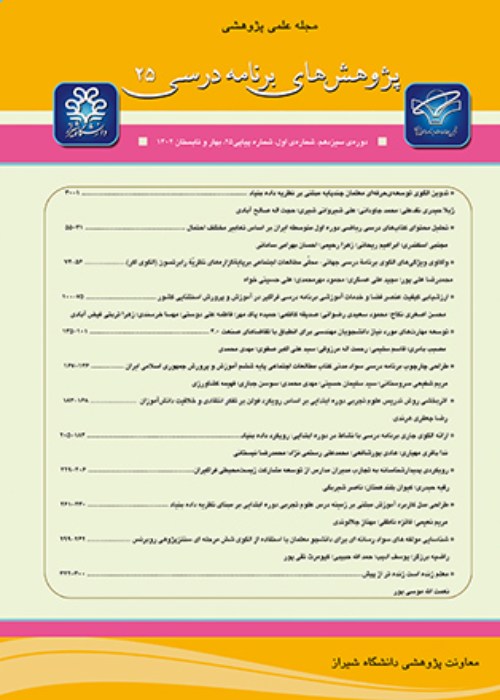Proposing A Model Of Specialized Knowledge Development Curriculum For Division Of Fractions Based On The School –Based Curriculum Development
Curriculum development is one of the basic pillars of the teaching-learning process. Teachers and educators can have prominent roles in curriculum development e and their functions in every stage of curriculum development process, i.e. from design to evaluation, can have positive or negative effects on learners' performance. Decentralization is one of the major challenges in curriculum development. Indeed, there has been a tendency to decentralize and delegate more authority to learning centers in the Public Education System with the aim of improving the quality of education in recent years. Decentralization in the curriculum development process can be considered as a kind of strategy to adapt the national curriculum to the conditions and characteristics of the areas and environments in which the curriculum is implemented. School–based curriculum development, which can be considered as a route to decentralization, requires that decisions about curriculum design be made, implementation of curriculum be considered, and evaluation of the curriculum be carried out inside, rather than outside, of learning and community centers. By developing a school-based curriculum, the teacher or instructor, themselves, can design, implement, and evaluate the curriculum. Considering the importance of the necessity for specialized content knowledge for teachers and primary school students and with regard to the lack of a specific program and framework for developing this type of knowledge in our country's mathematics curriculum, especially in the area of division of fractions, development of specialized content knowledge of division of fractions in primary school students through the development of a school–based curriculum can be of crucial importance.
The main question of the present study is whether the implementation of the curriculum for the development of specialized content knowledge of division of fractions based on school-based curriculum development in recent years has been effective in developing knowledge and skills and improving attitude of primary school student teachers?
This study which benefits from a mixed methods approach to research has been conducted in two phases. First, the qualitative phase was done through the use of exploratory research design and a case study method. Then, the quantitative phase was conducted using instrument development design and a quasi-experimental research method. Participants in the qualitative phase included math education specialists, faculty members in mathematics at Farhangian University, curriculum specialists, and researchers interested in this research area. After reviewing the resources and interviewing the experts, the present researchers developed a model of specialized knowledge development curriculum for division of fractions. The statistical population in the quantitative section were primary school student teachers at Farhangian University, of whom were selected through convenience sampling. Next, the findings of the qualitative phase was used to design a curriculum model in form of an educational program. Now, primary school student teachers’ specialized content knowledge of division of fractions was assessed by administering both a pre- and a post-tests, designed by the present researchers. , Participants' attitudes towards division of fractions were then sought using the newly designed Fraction Division Attitude Scale and the primary school student teachers’ skills in division of franction were assessed through carring out formative assessment.
In the first phase of this study, the present researchers used a case study method and four elements of purpose, content and learning activities, teaching-learning methods and evaluation methods to design a curriculum model for the development of specialized content knowledge of division of fractions of primary school student teachers . In the second phase, the designed curriculum was implemented on primary school student teachers in form of an educational program and it was tried to evaluate the extent in which the curriculum objectives were achieved. , the pre- and post-tests, the Fraction Division Attitude Scale and formative assessment were accordingly used here. An independent samples t-test was next run to analyze participants’ pretest scores and the results revealed no statistically significant difference between participants in experimental and control groups in their pretests results. In other words, participants of both the experimental and control groups had almost the same level of knowledge division of fractions - before the administration of the treatment, i.e. training through the use of the designed curriculum. Analysis of participants’ postscores was done by using analysis of covariance. The results revealed that participants in the experimental group, who were trained through the use of the newly developed conventional methods of teaching. In addition, it was revealed that implementation of the recent designed curriculum had a positive effect on the attitudes of participants in the experimental group. Moreover, classroom observations by the researchers during the process of formative assessment revealed that participants in the experimental group were more skilled at doing division of fractions than participants in the control group.
The findings of the present study showed that the implementation of the newly designed specialized knowledge development curriculum for division of fractions based on school–based curriculum development led to improvement of students and teachers’ knowledge and skills in dividing fractions, increase their interest and promote their attitude towards teaching and learning division of fractions. Development of school-based curriculums, l can help decentralize centralized curriculums, which usually exist in form of general curriculums in educational centers. Therefore, it is recommended that the curriculum designed in this study canbe used in teacher training centers involved in teaching primary school student teachers.
- حق عضویت دریافتی صرف حمایت از نشریات عضو و نگهداری، تکمیل و توسعه مگیران میشود.
- پرداخت حق اشتراک و دانلود مقالات اجازه بازنشر آن در سایر رسانههای چاپی و دیجیتال را به کاربر نمیدهد.


